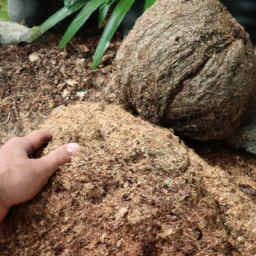Gardening with Coconut Coir How To Use It
How To Use Coconut Coir In Gardening
How To Use Coconut Coir In Gardening
Coconut coir is considered a sustainable, eco-friendly resource that helps to promote healthy soil development and can provide a great way to improve water retention both above and below ground. It also contains natural nitrogen and phosphorous that helps to improve the neutralization of soil, making it an ideal material for gardening needs. In this article, we will explore the features, benefits, pros & cons, case studies, commonly asked questions, mistakes people make, and best practices for using coconut coir in gardening.
Features
Coconut coir is the natural fiber found between the hard, internal shell and the outer coat of a coconut. This fiber is treated and processed for gardening purposes because it's naturally rich in organic matter and salts. It's also relatively inexpensive, making it an ideal material for indoor and outdoor use.
Benefits
Coconut coir helps to create a porous substrate that retains moisture well and does not compact, helping promote optimal air-to-root ratios and healthy soil. This substrate also aids in water retention, meaning water can seep down deep into the soil that's saturated with coconut coir. The presence of coconut coir also provides natural elements that enrich the soil, adjust pH levels, and improve microbial activity for healthy plant growth.
Pros & Cons
The pros of using coconut coir for gardening are the affordability, sustainability, easy of use, and hydration capabilities. It helps to create a well-aerated and porous substrate that supports the growth of beneficial organisms and also reduces water use.
The cons of using coconut coir for gardening is that it can be challenging to work with if wet, and it can also cause an imbalance of pH levels if left untreated and therefore be harmful to certain plants. It can also create an impermeable barrier that interrupts the flow of water and air and should be avoided when working with shallow-rooted plants.
Case Studies
Case Study 1: Oakland Nursery in Ohio
The Oakland Nursery in Ohio used coconut coir in their outdoor gardens to create an overall healthy and balanced environment for their plants. The addition of the coconut coir allowed the nursery to increase aeration and reduce water usage in the area, while creating a better habitat for their plants.
Case Study 2: Sprouts Farmers Market
Sprouts Farmers Market implemented coconut coir into their growing process to reduce water usage and help create healthier soil for their plants. They found that the coir helped to increase air and water retention, enabling their plants to flourish in their environment.
Frequently Asked Questions
Q. How Is Coconut Coir Applied?
The best way to apply coconut coir is to mix it with existing soil, compost, or other organic matter to create a more nutrient-rich environment. You can also create a top-dressing of coconut coir or mix it directly into the soil.
Q. How Much Does Coconut Coir Cost?
The cost of coconut coir varies depending on where you purchase it and in what quantity. However, it is typically more cost-effective than other organic amendments.
Q. How Long Does Coconut Coir Last?
Coconut coir is a slow decomposing material that can last up to five years with proper care and maintenance. It is important to note that it can start to break down over time if not properly managed.
Mistakes People Make
One of the most common mistakes people make when using coconut coir in their gardens is failure to apply the appropriate amount. Too much coconut coir can cause an imbalance in the air-to-root ratios and can also cause a build-up of salts in the soil. It's also important to properly hydrate coconut coir as failure to do so can cause it to become compact and difficult to work with. Additionally, people sometimes forget to add organic matter such as compost or other amendments to their coconut coir mix.
Best Practices
The best practice when using coconut coir in your garden is to start with a smaller amount and gradually increase as needed. It's also important to mix the coir with other organic matter such as compost, peat moss, or soil to create a balanced substrate for plants. Finally, ensure the coir is properly hydrated before application as this will make it easier to work with.
Summary
Coconut coir is an ideal material for gardening as it helps to promote healthy soil development and water retention. This natural fiber can also be used to adjust pH levels and improve microbial activity for healthy plant growth. While it does have its benefits, it's important to remember to apply the appropriate amount and hydrate it before use. Additionally, it's advisable to mix coconut coir with other organic amendments to create a nutrient-rich substrate for your plants.
Final Notes
Using coconut coir in gardening can be a great way to promote healthy soil development and water retention, but it's important to remember to apply it correctly and to mix it with other organic amendments. With proper use, coconut coir can help to create a balanced and healthy environment for your plants and will ensure they receive all of the necessary nutrients for healthy growth.

Previous Page
